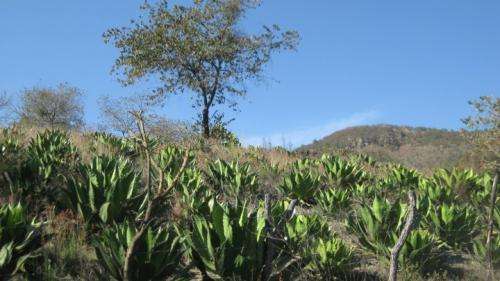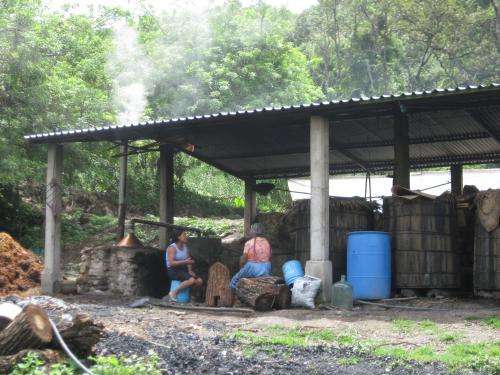One battle in the war over Mexico's agave spirits

In 2011 and 2012, Mexico was the site of a battle over precisely how agave-based liquors could be branded or marketed. In the end, as outlined in a new paper in the journal Gastronomica, U.S. bartenders, retailers, and consumers played a key role in the debate – which raises some interesting questions about how to best protect local food customs and producers.
To understand the debate in Mexico, you have to know a little about mezcal.
On the one hand, mezcal is a generic term for any distilled liquor made from the roasted "heart" of the agave plant. While tequila may be the most famous type of mezcal, mezcal is produced across Mexico, and the production practices and varieties of agave used vary from region to region.
But since 1994, mezcal has also been protected by a "geographic indication," or GI – a legal designation that ties a product to a specific place. The GI states that registered mezcal can only be produced in defined parts of eight Mexican states.
"This gets really confusing, because the word mezcal has two different definitions: the generic term for the spirit, and the legal term for the spirit distilled only in those eight states," says Sarah Bowen, a sociologist at NC State and author of the forthcoming book Divided Spirits: Tequila, Mezcal, and the Politics of Production (University of Calfornia Press, 2015).
"People making mezcal outside of those eight states can't call it mezcal on the label," explains Bowen, who is also lead author of the Gastronomica paper. "It would be as if winemakers couldn't use the word 'wine' on their labels unless the wine was made in Bordeaux."
The 1994 GI was a big deal, because it posed a challenge for mezcal producers outside of the defined GI area – they had to sell their products as "agave distillates" instead of "mezcal." That's a tough sell.

But in 2011, two proposals were put forward in Mexico that would have made things even tougher.
Essentially, the two proposals would have prevented mezcal producers outside the GI area from even using the word "agave" on their labels or in their marketing campaigns. Instead, they would have had to use the scientific name "agavacea."
"This would be as if France decided to restrict the use of the word 'grape' to winemakers in Bordeaux," Bowen says.
Unsurprisingly, distilleries large and small from outside the GI area decided to push back. And so did an array of activists, bartenders, academics, and consumer advocates in Mexico, who argued that the proposals threatened small and artisanal mezcal producers.
"You have to understand that, up until this point, the most powerful players had won every battle over how to regulate agave spirits," Bowen says. And those powerful players were the large tequila and mezcal companies inside the GI regions.
But then something surprising happened. Bartenders, liquor retailers, and consumers in the United States got involved.
The efforts of a small group of bartenders and retailers in the U.S. caught public attention through social media, resulting in multiple petitions to the Mexican government and a public campaign to reject the agave proposals.
By August 2012, the proposals were dead in the water.
"The combination of small producers and their advocates in Mexico, working with consumers and retailers in the U.S., led to one of the first cases of successful opposition to the huge distilleries and multinational companies that dominate the tequila and mezcal industries," Bowen says.
"This does highlight the role of consumers in helping to protect small producers and what they see as 'authentic' production practices," Bowen says. "This is a hopeful story. But it also raises some concerns.
"Both the proposals and the movement that opposed them were based on appeals to consumers," Bowen explains. "Regulatory policies need to consider more than just consumer demand, which is inherently volatile and may not be aligned with producers' priorities. They need to take into account the needs of distilleries, workers, farmers, in addition to considering how regulations affect the environment and local traditions and practices.
"As producers, consumers, and governmental representatives – in Mexico and around the world – continue to debate how to best protect local foods and drinks, there is a need to move beyond market-based solutions to create more democratic and inclusive ways of valuing and preserving these products and the people who make them."
More information: Sarah Bowen and Danny Hamrick. 2014. "Defining Mexico's Spirit," Gastronomica. DOI: 10.1525/gfc.2014.14.4.26.

















